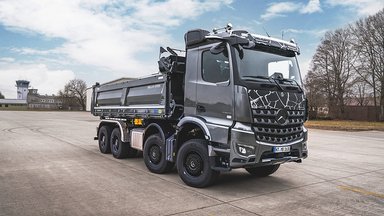
Full power– even more efficiency: In 2022, Mercedes-Benz Trucks will be launching the third generation of its OM 471 heavy-duty commercial vehicle engine on the market
Download

Full power– even more efficiency: In 2022, Mercedes-Benz Trucks will be launching the third generation of its OM 471 heavy-duty commercial vehicle engine on the market
Drivetrain optimization Further reduction of fuel consumption by up to 4 percent Newly-developed exhaust gas aftertreatment system Increased fuel efficiency and compliance with the strictest emissions standards such as Euro VIe Made-to-order turbochargers in a fuel consumption- and performance-optimized variant Powershift Advanced for faster gear shifts and clear reduction of torque interruption Extended Top Torque range for…
- Drivetrain optimization
- Further reduction of fuel consumption by up to 4 percent
- Newly-developed exhaust gas aftertreatment system
- Increased fuel efficiency and compliance with the strictest emissions standards such as Euro VIe
- Made-to-order turbochargers in a fuel consumption- and performance-optimized variant
- Powershift Advanced for faster gear shifts and clear reduction of torque interruption
- Extended Top Torque range for more torque in gears 7 to 12
- Manufactured at the Mannheim engine plant
- Karin Rådström, CEO Mercedes-Benz Trucks: "With the third generation of the OM 471, we consistently focused on the needs of our customers. Our goal was to decrease the Total Cost of Ownership (TCO) and reduce fuel consumption. Our customers will benefit, as will the environment."
Stuttgart– Powerful, extremely reliable, profitable in day-to-day operations, fuel-saving and yet also dynamic: Haulage firms make a variety of demands on their trucks– because they are what earn them their crust. Especially given the acute shortage of drivers, it is also important to have a strong trump card in hand, namely trucks that drivers enjoy driving. The drivetrain, which constitutes approx. 50 percent, and thus the largest share, of a truck’s added value, plays an important part here.
Mercedes-Benz Trucks has already set new standards with its two previous generations of its OM 471 heavy-duty engine: The engine system, transmission and axles of the integrated drivetrain around the OM 471 are optimally configured to each other, and manufactured in the company’s own power systems plants to the highest quality standards. The Mercedes-Benz Mannheim plant takes the lead here: a center of competence for heavy-duty commercial vehicle engines from Daimler Truck and part of the global production network for drive components.
High-tech pays off
With the third generation now available to order and available from October 2022, Mercedes-Benz Trucks is launching the next stage and fielding its best-selling heavy-duty commercial vehicle engine with a whole range of efficiency-enhancing innovations. Each of these optimization measures helps serve the high demands of fleet operators and professional truck drivers.
Karin Rådström, Member of the Board of Management of Daimler Truck Holding AG, responsible for the Europe and Latin America regions, and the brand
Mercedes-Benz Trucks: “With the third generation of the OM 471, we consistently focused on the needs of our customers. Our goal was to decrease the Total Cost of Ownership (TCO) and reduce fuel consumption. Our customers will benefit, as will the environment.”
The third generation of the OM 471 installed in the Mercedes-Benz Actros and the Mercedes-Benz Arocs features a host of technical innovations. “All innovations that consistently aim at reducing the Total Cost of Ownership (TCO) in terms of fuel-saving driving, lower operating costs and higher yields, without sacrificing performance, driving dynamics or driving comfort,” explains Christoph Mertens, Project Manager for the new engine at Daimler Truck. Like the earlier second generation, engineers at Mercedes-Benz Trucks have again made remarkable progress with their third generation. In other words: High-tech pays off, is good for the environment, and makes driving fun.
Greater fuel efficiency thanks to further optimized combustion, application-oriented turbochargers and reduced friction
The improvements in efficiency for the third generation of the OM 471 are the result of a number of engine innovations. For example, the geometry of the piston recess, the injection nozzle design and the parameters of the cylinder head relevant for gas exchange were subject to an extensive optimization process. In this way, the compression ratio of the six-cylinder in-line engine has been increased from 18.3:1 to 20.3:1, this leads to more efficient combustion with a peak ignition pressure of 250 bar.
One of the most important levers in increasing fuel efficiency in modern diesel combustion engines is turbocharging optimization. With the third generation of the OM 471, Mercedes-Benz Trucks is introducing two new turbochargers developed and manufactured in-house which are precisely adapted to the broad range of customer requirements. In the consumption-optimized variant, the focus is on the lowest possible fuel consumption– it is predestined for use in long-distance haulage with an engine rated at up to 350 kW (476 hp).
The second turbocharger variant is designed for high performance and a high engine braking force and is ideal for use in the heavy-duty- and construction sector with an engine rating of up to 390 kW (530 hp). For the lower and medium performance levels of the OM 471, the maximum fuel saving compared with the previous generation is up to four percent, and for the upper performance levels up to 3.5 percent. Thanks to lower consumption, both operating costs as well as CO2 emissions are reduced. The high-power variant is also used in the lower performance levels for the construction applications of the Arocs.
Reduced friction losses and pressure control with low-viscosity oil
In addition to combustion and turbocharging, friction reduction is the third important lever for improving fuel efficiency. For this purpose, the third-generation OM 471 has a newly developed engine oil pressure control valve. It is installed behind the engine oil pump and in front of the oil thermostat. An electrical actuator enables characteristics map-controlled use of the pressure-reducing valve. Available reductions in engine oil pressure are determined in a complex matrix that takes into account all engine components and their specific requirements, such as lubrication or cooling. A newly-developed engine oil with low viscosity enhances oil pressure control– it improves fuel efficiency without reducing oil change intervals or increasing the wear on affected engine components.
Newly-developed exhaust gas aftertreatment system
The exhaust gas aftertreatment system, which has been completely revamped and adapted to the new combustion and control system of the OM 471, also helps improve fuel efficiency. The system limits the counterpressure and also increases the uniformity index of the AdBlue, which leads to improved NOx conversion and lower fuel consumption. The NOx sensors together with the closed and adaptive NOx closed-loop control circuit and a predictive SCR temperature model have enabled emission stability to be improved even further. It is even compliant with the strictest emission standards, such as Euro VIe, which call for effective limitation of exhaust gas emissions over the entire normal service life of a vehicle under normal usage conditions.
High driving dynamics thanks to PowerShift Advanced and Top Torque
Alongside profitability, robustness and reliability, Mercedes-Benz Trucks has once again turned its attention to another important factor for customers in the third generation of the OM 471, namely driving dynamics. Engineers have trained their sights on the drivetrain for this purpose. For example, the new PowerShift Advanced automated transmission control enables faster and smoother moving off and acceleration in many situations thanks to precise gear selection. Faster gear changes reduce the torque interruption time by up to 40 percent in the upper range. Accelerator pedal parameterization has also been further optimized: Increased sensitivity in the lower pedal travel enables significantly more sensitive maneuvering, while the direct response time in the upper pedal travel results in increased dynamics under high load requirements. It also makes it easier to drive around, and accelerate out of roundabouts.
Another highlight is the extended Top Torque range. Available for engine output levels 330 kW (450 hp) and 350 kW (476 hp) in conjunction with the G281 transmission, a powerful 200 Nm torque is available to the crankshaft in gears 7 to 12 in the "A Standard" program. "Power at the press of a button" for more performance that is available when you really need it – for example on highway on-ramps or when overtaking. All the while saving diesel. More added value that pays off in every respect for drivers and fleet operators alike.
Article assets

Full power– even more efficiency: In 2022, Mercedes-Benz Trucks will be launching the third generation of its

Full power– even more efficiency: In 2022, Mercedes-Benz Trucks will be launching the third generation of its

Full power– even more efficiency: In 2022, Mercedes-Benz Trucks will be launching the third generation of its

Full power– even more efficiency: In 2022, Mercedes-Benz Trucks will be launching the third generation of its

Full power– even more efficiency: In 2022, Mercedes-Benz Trucks will be launching the third generation of its

Carola Pfeifle
Spokesperson Product Communications Mercedes-Benz Trucks
carola.pfeifle@daimlertruck.com
+49 160 8612423

Ulrike Burkhart
Spokesperson Mercedes-Benz Trucks Product, Service & eTruck
ulrike.burkhart@daimlertruck.com
+49 160 861 3757







